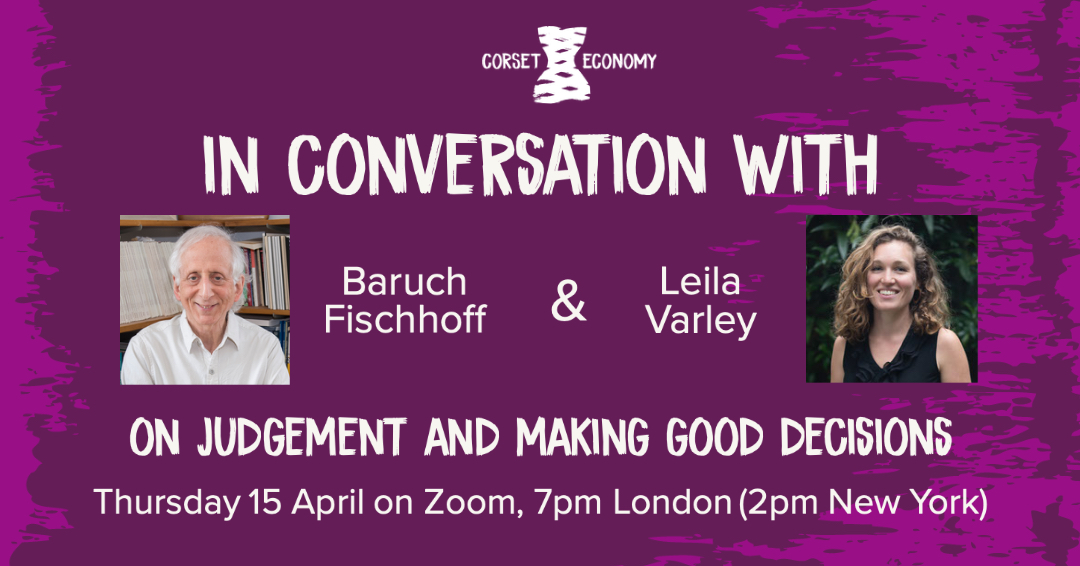Lessons on decision-making from Baruch Fischhoff

We were thrilled to have Baruch Fischhoff, Howard Heinz Professor at Carnegie Mellon University join us for an interview last week – thank you to all who attended! There were so many interesting points Baruch made that we will mull over them for a long time going forward, but we want to give you our main takeaways from this rich discussion.
“There are lots of things that would be nice to know, but aren’t what you need to know”
Our key takeaway was the answer to our million-dollar question – what makes a good decision-maker? Baruch referenced the work of his [Nobel-prizewinning] colleague, Herbert Simon, who identified two ways of approaching decision-making: bounded rationality and satisficing.
Bounded rationality takes place where the decision-maker sets boundaries and ignores anything outside these, accepting the fact that they may be blindsided by something they’ve chosen to ignore. The alternative approach of satisficing (a word made up of satisfy + suffice) gives up on getting it perfect in favour of a solution that’s good enough and includes things that cannot be quantified. According to Baruch, the wise decision-maker will be satisficing, whilst with bounded rationality there is “often smarts, but rarely wisdom”.
To do either of those you need to decide what you look at. For us, this is the ‘Goldilocks’ effect: too much information and data and you’re overwhelmed or mired in the detail, too little and you airbrush or ignore things that might be critical. Somewhere between the two is the balance, the sweet spot of ‘just right’. The way to get this right is through trial and error, trying to figure out ways that work and learning from what doesn’t.
“Good decisions are not the same as lucky decisions.”
Baruch, a world expert on ‘hindsight bias’ (which is when people look at the past and fail to remember the level of uncertainty there was at the time the decision was made) reminded us that sometimes we can look at past decisions and categorise them as good decisions, whilst in effect we were simply lucky. Our blurring the lines between them is called ‘outcome bias’. We will do a separate blog on Baruch’s work on hindsight bias later!
“We are all prisoners of our own experience & we look at the world in incomplete, biased ways”
Everybody has their own mental model, which is how we interpret the world and so is inherently biased by your lived experience, education, surroundings etc. Acknowledging you have a mental model – and blind spots – is critical when it comes to making big decisions so you’re not blindsided by what you don’t see.
To overcome these biases, diversity of thinking is key. Baruch stressed the importance of talking to other people candidly, and drawing on their differing insights. He also remarked that scenarios (like our Corset Futures) are a useful tool. This is because they incorporate multiple perspectives in order to create an encompassing view of the world and future.
“The big question is how stable [the world] is going to be – maybe things don’t change all that quickly.”
When making any major decision one of the critical elements to consider is the level of uncertainty. In Baruch’s words: “When there is uncertainty, things will inevitably change, and the greater the level of complexity or multiple systems, the greater the potential for such change.”
“Everybody is constrained in their decision-making, we all have limited resources”
Baruch reflected that decision-makers, whether individual or institutional, always make decisions with limited resources. We found it heartening yet surprising that individuals are in effect better equipped than public policymakers, because they have the ability to be less constrained in their thinking, which can lead to better decisions.
So, what are some practical takeaways you can do to ensure you make better decisions?
- Satisfice: When the world is becoming more complex and uncertain, avoid mechanistic solutions and reductionism. Look wider, rather than narrow down.
- Recording: Make notes or records of how you’ve made key decisions. This way you can pick up patterns of successes or failures, and maybe you can also spot biases you need to be attentive to.
- Look for alternatives: There is always more than one option – the trick is thinking laterally to find the options that are not immediately apparent but might be the most effective. We use our Corset Futures as a strategic tool to do just this.
- Acknowledge your biases: We all have habitual ways of looking at things, which are useful, but they are always imperfect. The trick is to be alert to their limitations.
- Collaboration: More minds with heterogeneous backgrounds (not self-reinforcing groups or echo chambers) sharing perspectives in a respectful, facilitative way creates more robust decision-making, at every level from global policy to the individual. Thinking is the resource which is plentiful supply, and it is this that enables us to avoid either an abundance of caution or adverse effects. This is why we are committed to building the Corset Economy community.
If you want to read more about Baruch and his work you can find him at https://www.cmu.edu/epp/people/faculty/baruch-fischhoff.html
